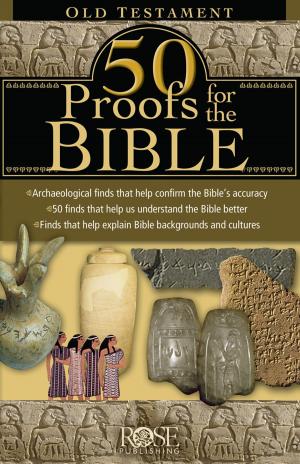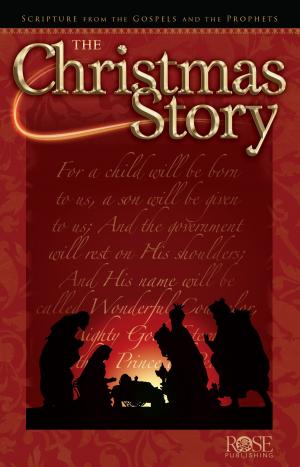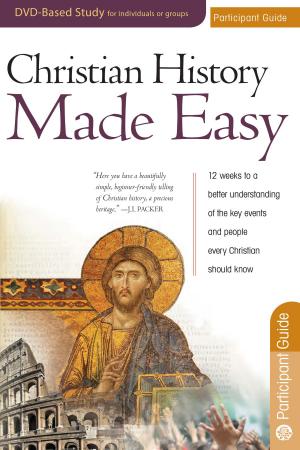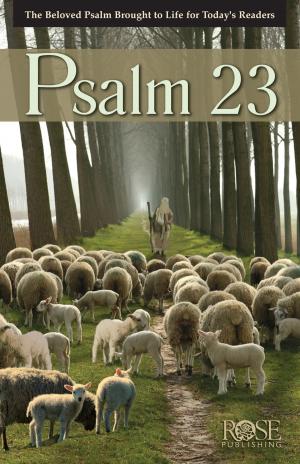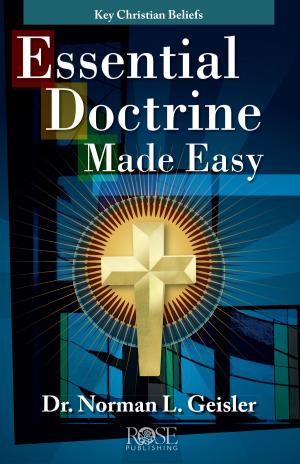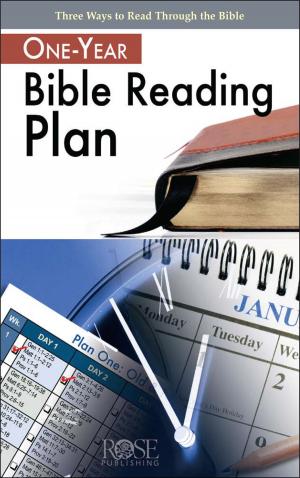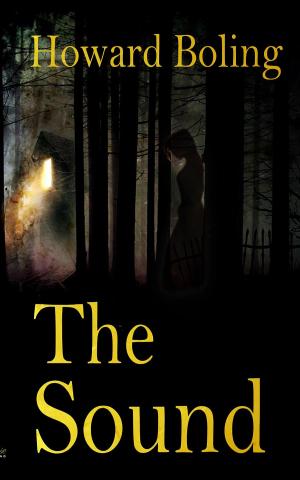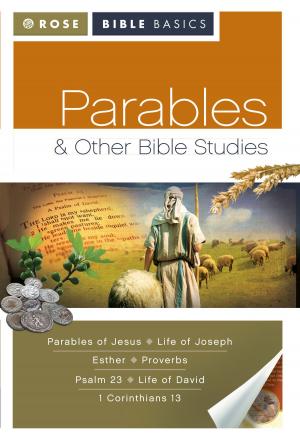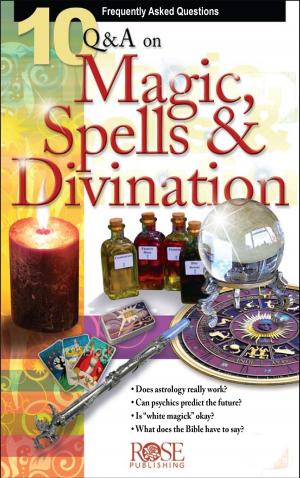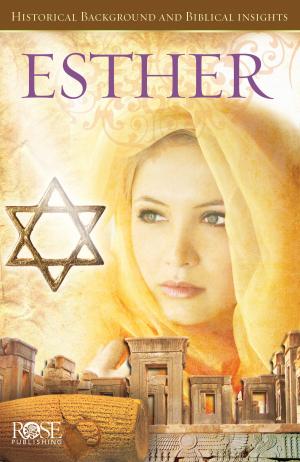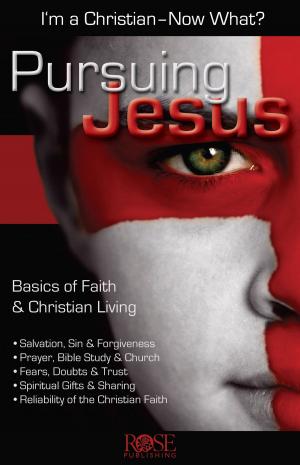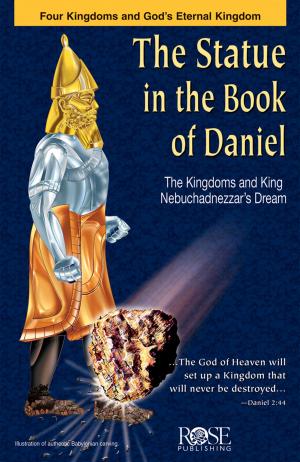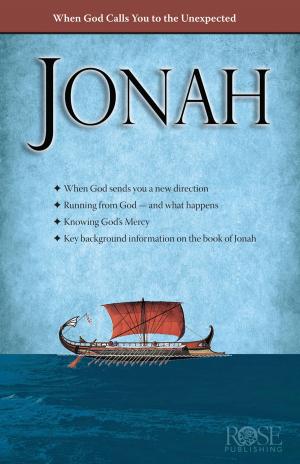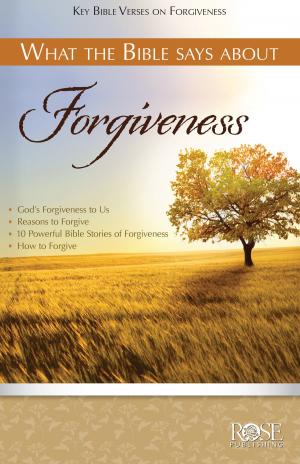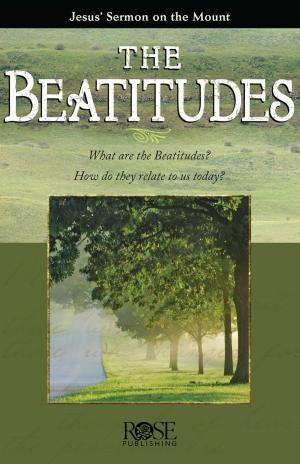Feasts & Holidays of Bible
Nonfiction, Religion & Spirituality, Bible & Bible Studies, Study, Old Testament| Author: | Rose Publishing | ISBN: | 9781596365414 |
| Publisher: | Rose Publishing, Inc. | Publication: | December 6, 2013 |
| Imprint: | Rose Publishing, Inc. | Language: | English |
| Author: | Rose Publishing |
| ISBN: | 9781596365414 |
| Publisher: | Rose Publishing, Inc. |
| Publication: | December 6, 2013 |
| Imprint: | Rose Publishing, Inc. |
| Language: | English |
Feasts of the Bible - Jewish Roots of Believers in Yeshua (Jesus)
Throughout the Old Testament, God commanded the children of Israel to observe his holy days (holidays) to remember the mighty things that he had done in the lives of Israel's forefathers. The Feasts of the Bible ebook celebrates and explains the meaning behind the different feasts and why they are important to God. Feasts of the Bible contains an easy-to-read chart that provides each holiday's name, explanation, date of observance, and symbolic meaning pointing to Jesus as the promised Messiah.
Why should you learn about the Hebrew roots of Christianity?
As a Jew, Jesus celebrated these feasts and holidays each year. The ebook is an excellent tool to learn about the Jewish roots of Christianity and to discover Yeshua, "Jesus," in each "holy day." The ebook shows the Hebrew name, spelling, pronunciation, symbolism of Jesus, Bible references, and New Testament fulfillment for each of God's appointed feasts:
•Passover (Pesach)
•Unleavened Bread (Hag HaMatzot)
•Firstfruits (Yom HaBikkurim)
•Feast of Weeks or Pentecost (Shavuot)
•Feast of Trumpets or Rosh HaShanah (New Year)
•Day of Atonement or Yom Kippur
•Tabernacles or Sukkot (Feast of Booths)
•Rejoicing in the Law or Torah (Simchat)
•Feast of Dedication or Hanukkah (Chanukah or Feast of Lights)
•Feast of Lots or Purim
The Feasts of the Bible ebook provides important insights into the works of God on behalf of his chosen people. Feasts of the Bible is a celebration of the rich and meaningful heritage given to believers through Christ. The ebook reveals insightful and historical facts about each of the holidays; for example -
•Passover: A hymn is usually sung at the end of the Passover service, as was the case with Jesus and his disciples during the Last Supper (Matthew 26:30).
•During the Rosh HaShanah synagogue services, the shofar (ram's horn) is blown 100 times.
•Hanukkah is known as the Feast of Lights or the Feast of Dedication because of a legendary miraculous provision of oil for the eternal light in the Temple.
•Purim marks the deliverance of the Jews through Queen Esther.
Feasts of the Bible also includes additional fascinating facts about the feasts of the Bible; for instance:
•Leviticus 23 is sometimes called "God's calendar of redeeming grace" because the 44 verses tell of God's redemptive plan.
•God told Moses that seven of the feasts were to be "appointed feasts of the Lord" and were to be proclaimed as sacred assemblies (Leviticus 23:1 & 2).
•Three of the feasts were pilgrimage feasts.
Feasts of the Bible is a fantastic teaching tool for churches and groups who want to explore their Jewish heritage found in Christ. Believers will also find the observance of the feasts and holidays as a meaningful way to add depth to their devotion to God.
There's a small group DVD-based curriculum to go with this pamphlet. Click here (or go to FeastsOfTheBible.com) to see sample videos, sample sessions from the leader and participant guides, and to find out more about the Feasts of the Bible DVD-based study.
•September 4, 2013 - RoshHaShana (Jewish New Year)
•September 13-14, 2013- Yom Kippur
•September 18, 2013 - Sukkot
Throughout the Old Testament, God commanded the children of Israel to observe his holy days (holidays) to remember the mighty things that he had done in the lives of Israel's forefathers. The Feasts of the Bible ebook celebrates and explains the meaning behind the different feasts and why they are important to God. Feasts of the Bible contains an easy-to-read chart that provides each holiday's name, explanation, date of observance, and symbolic meaning pointing to Jesus as the promised Messiah.
Why should you learn about the Hebrew roots of Christianity?
As a Jew, Jesus celebrated these feasts and holidays each year. The ebook is an excellent tool to learn about the Jewish roots of Christianity and to discover Yeshua, "Jesus," in each "holy day." The ebook shows the Hebrew name, spelling, pronunciation, symbolism of Jesus, Bible references, and New Testament fulfillment for each of God's appointed feasts:
•Passover (Pesach)
•Unleavened Bread (Hag HaMatzot)
•Firstfruits (Yom HaBikkurim)
•Feast of Weeks or Pentecost (Shavuot)
•Feast of Trumpets or Rosh HaShanah (New Year)
•Day of Atonement or Yom Kippur
•Tabernacles or Sukkot (Feast of Booths)
•Rejoicing in the Law or Torah (Simchat)
•Feast of Dedication or Hanukkah (Chanukah or Feast of Lights)
•Feast of Lots or Purim
The Feasts of the Bible ebook provides important insights into the works of God on behalf of his chosen people. Feasts of the Bible is a celebration of the rich and meaningful heritage given to believers through Christ. The ebook reveals insightful and historical facts about each of the holidays; for example -
•Passover: A hymn is usually sung at the end of the Passover service, as was the case with Jesus and his disciples during the Last Supper (Matthew 26:30).
•During the Rosh HaShanah synagogue services, the shofar (ram's horn) is blown 100 times.
•Hanukkah is known as the Feast of Lights or the Feast of Dedication because of a legendary miraculous provision of oil for the eternal light in the Temple.
•Purim marks the deliverance of the Jews through Queen Esther.
Feasts of the Bible also includes additional fascinating facts about the feasts of the Bible; for instance:
•Leviticus 23 is sometimes called "God's calendar of redeeming grace" because the 44 verses tell of God's redemptive plan.
•God told Moses that seven of the feasts were to be "appointed feasts of the Lord" and were to be proclaimed as sacred assemblies (Leviticus 23:1 & 2).
•Three of the feasts were pilgrimage feasts.
Feasts of the Bible is a fantastic teaching tool for churches and groups who want to explore their Jewish heritage found in Christ. Believers will also find the observance of the feasts and holidays as a meaningful way to add depth to their devotion to God.
There's a small group DVD-based curriculum to go with this pamphlet. Click here (or go to FeastsOfTheBible.com) to see sample videos, sample sessions from the leader and participant guides, and to find out more about the Feasts of the Bible DVD-based study.
•September 4, 2013 - RoshHaShana (Jewish New Year)
•September 13-14, 2013- Yom Kippur
•September 18, 2013 - Sukkot
Feasts of the Bible - Jewish Roots of Believers in Yeshua (Jesus)
Throughout the Old Testament, God commanded the children of Israel to observe his holy days (holidays) to remember the mighty things that he had done in the lives of Israel's forefathers. The Feasts of the Bible ebook celebrates and explains the meaning behind the different feasts and why they are important to God. Feasts of the Bible contains an easy-to-read chart that provides each holiday's name, explanation, date of observance, and symbolic meaning pointing to Jesus as the promised Messiah.
Why should you learn about the Hebrew roots of Christianity?
As a Jew, Jesus celebrated these feasts and holidays each year. The ebook is an excellent tool to learn about the Jewish roots of Christianity and to discover Yeshua, "Jesus," in each "holy day." The ebook shows the Hebrew name, spelling, pronunciation, symbolism of Jesus, Bible references, and New Testament fulfillment for each of God's appointed feasts:
•Passover (Pesach)
•Unleavened Bread (Hag HaMatzot)
•Firstfruits (Yom HaBikkurim)
•Feast of Weeks or Pentecost (Shavuot)
•Feast of Trumpets or Rosh HaShanah (New Year)
•Day of Atonement or Yom Kippur
•Tabernacles or Sukkot (Feast of Booths)
•Rejoicing in the Law or Torah (Simchat)
•Feast of Dedication or Hanukkah (Chanukah or Feast of Lights)
•Feast of Lots or Purim
The Feasts of the Bible ebook provides important insights into the works of God on behalf of his chosen people. Feasts of the Bible is a celebration of the rich and meaningful heritage given to believers through Christ. The ebook reveals insightful and historical facts about each of the holidays; for example -
•Passover: A hymn is usually sung at the end of the Passover service, as was the case with Jesus and his disciples during the Last Supper (Matthew 26:30).
•During the Rosh HaShanah synagogue services, the shofar (ram's horn) is blown 100 times.
•Hanukkah is known as the Feast of Lights or the Feast of Dedication because of a legendary miraculous provision of oil for the eternal light in the Temple.
•Purim marks the deliverance of the Jews through Queen Esther.
Feasts of the Bible also includes additional fascinating facts about the feasts of the Bible; for instance:
•Leviticus 23 is sometimes called "God's calendar of redeeming grace" because the 44 verses tell of God's redemptive plan.
•God told Moses that seven of the feasts were to be "appointed feasts of the Lord" and were to be proclaimed as sacred assemblies (Leviticus 23:1 & 2).
•Three of the feasts were pilgrimage feasts.
Feasts of the Bible is a fantastic teaching tool for churches and groups who want to explore their Jewish heritage found in Christ. Believers will also find the observance of the feasts and holidays as a meaningful way to add depth to their devotion to God.
There's a small group DVD-based curriculum to go with this pamphlet. Click here (or go to FeastsOfTheBible.com) to see sample videos, sample sessions from the leader and participant guides, and to find out more about the Feasts of the Bible DVD-based study.
•September 4, 2013 - RoshHaShana (Jewish New Year)
•September 13-14, 2013- Yom Kippur
•September 18, 2013 - Sukkot
Throughout the Old Testament, God commanded the children of Israel to observe his holy days (holidays) to remember the mighty things that he had done in the lives of Israel's forefathers. The Feasts of the Bible ebook celebrates and explains the meaning behind the different feasts and why they are important to God. Feasts of the Bible contains an easy-to-read chart that provides each holiday's name, explanation, date of observance, and symbolic meaning pointing to Jesus as the promised Messiah.
Why should you learn about the Hebrew roots of Christianity?
As a Jew, Jesus celebrated these feasts and holidays each year. The ebook is an excellent tool to learn about the Jewish roots of Christianity and to discover Yeshua, "Jesus," in each "holy day." The ebook shows the Hebrew name, spelling, pronunciation, symbolism of Jesus, Bible references, and New Testament fulfillment for each of God's appointed feasts:
•Passover (Pesach)
•Unleavened Bread (Hag HaMatzot)
•Firstfruits (Yom HaBikkurim)
•Feast of Weeks or Pentecost (Shavuot)
•Feast of Trumpets or Rosh HaShanah (New Year)
•Day of Atonement or Yom Kippur
•Tabernacles or Sukkot (Feast of Booths)
•Rejoicing in the Law or Torah (Simchat)
•Feast of Dedication or Hanukkah (Chanukah or Feast of Lights)
•Feast of Lots or Purim
The Feasts of the Bible ebook provides important insights into the works of God on behalf of his chosen people. Feasts of the Bible is a celebration of the rich and meaningful heritage given to believers through Christ. The ebook reveals insightful and historical facts about each of the holidays; for example -
•Passover: A hymn is usually sung at the end of the Passover service, as was the case with Jesus and his disciples during the Last Supper (Matthew 26:30).
•During the Rosh HaShanah synagogue services, the shofar (ram's horn) is blown 100 times.
•Hanukkah is known as the Feast of Lights or the Feast of Dedication because of a legendary miraculous provision of oil for the eternal light in the Temple.
•Purim marks the deliverance of the Jews through Queen Esther.
Feasts of the Bible also includes additional fascinating facts about the feasts of the Bible; for instance:
•Leviticus 23 is sometimes called "God's calendar of redeeming grace" because the 44 verses tell of God's redemptive plan.
•God told Moses that seven of the feasts were to be "appointed feasts of the Lord" and were to be proclaimed as sacred assemblies (Leviticus 23:1 & 2).
•Three of the feasts were pilgrimage feasts.
Feasts of the Bible is a fantastic teaching tool for churches and groups who want to explore their Jewish heritage found in Christ. Believers will also find the observance of the feasts and holidays as a meaningful way to add depth to their devotion to God.
There's a small group DVD-based curriculum to go with this pamphlet. Click here (or go to FeastsOfTheBible.com) to see sample videos, sample sessions from the leader and participant guides, and to find out more about the Feasts of the Bible DVD-based study.
•September 4, 2013 - RoshHaShana (Jewish New Year)
•September 13-14, 2013- Yom Kippur
•September 18, 2013 - Sukkot

